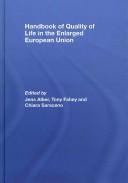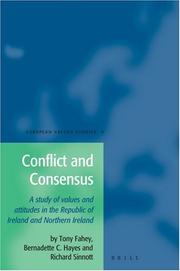| Listing 1 - 8 of 8 |
Sort by
|
Book
Abstract | Keywords | Export | Availability | Bookmark
 Loading...
Loading...Choose an application
- Reference Manager
- EndNote
- RefWorks (Direct export to RefWorks)
Book
ISBN: 9289709219 Year: 2005 Publisher: Dublin European foundation for the improvement of living and working conditions
Abstract | Keywords | Export | Availability | Bookmark
 Loading...
Loading...Choose an application
- Reference Manager
- EndNote
- RefWorks (Direct export to RefWorks)
Quality of life --- Questionnaires --- Income distribution --- Qualité de la vie --- Revenu --- Répartition --- #SBIB:303H34 --- #SBIB:316.8H15 --- Kwalitatieve methoden: grondige gevallenstudie, casework, social work --- Welzijns- en sociale problemen: sociale ongelijkheid en armoede --- 339.452 --- levensstandaard - welvaartspeil - levensomstandigheden --- Qualité de la vie --- Répartition
Book
ISBN: 1402069804 9048177820 9786611491796 1281491799 1402069812 Year: 2007 Publisher: Dordrecht : Springer,
Abstract | Keywords | Export | Availability | Bookmark
 Loading...
Loading...Choose an application
- Reference Manager
- EndNote
- RefWorks (Direct export to RefWorks)
The Irish economic boom has caused the economy in Ireland to roar ahead, but what has it done to Irish society? Some see the rising tide as having lifted all boats, while others argue that the benefits have accrued mostly to those who were already well placed. Some highlight how economic growth has raised living standards, while others say that it has imposed strains on family life, eroded values and communities, and created problems in accessing adequate housing, health care and other services. So, are we in Ireland now living in ‘the best of times’, or has increased prosperity come at (too high) a cost? And can the rest of the world draw any lessons from what has happened in Ireland? The purpose of this book, which contains a collection of chapters written by some of Ireland’s leading social researchers, is to bring to bear the latest research and empirical evidence to answer these questions. It is aimed at a general audience and seeks to contribute to public debate in Ireland and abroad, while at the same time striving for rigorous, evidence-based argument. The overall judgment offered by the book is positive, though with qualifications. Ireland still has problems: social inequalities are slow to narrow; the indignities of poverty and hopelessness, though less widespread than before, are still too common; some public services are poor; and traffic congestion frays the nerves. But there is a long list of social fundamentals that are stronger today than before the economic boom arrived. National moral is among the highest in Europe, most people’s economic circumstances have greatly improved, jobs are astonishingly abundant, people are now flocking into the country rather than out of it, and they are marrying and having children at a higher rate than fifteen years ago. These are only some of the positives identified in the book. Together they suggest that even on social grounds the Irish economic boom deserves at least two cheers, even if it has far from succeeded in solving all social ills.
Ireland -- Economic conditions -- 21st century. --- Ireland -- Social conditions -- 21st century. --- Quality of life -- Ireland. --- Economic History --- Social Sciences - General --- Business & Economics --- Social Sciences --- Ireland --- Economic conditions --- Social conditions --- Irish Free State --- Social sciences. --- Medical research. --- Quality of life. --- Social Sciences. --- Social Sciences, general. --- Quality of Life Research. --- Life, Quality of --- Economic history --- Human ecology --- Life --- Social history --- Basic needs --- Human comfort --- Social accounting --- Work-life balance --- Biomedical research --- Medical research --- Behavioral sciences --- Human sciences --- Sciences, Social --- Social science --- Social studies --- Civilization --- Quality of Life --- Research.

ISBN: 9780415424677 0415424674 9780203936306 0203936302 113897577X 9786611063382 1134095945 128106338X 9781134095896 9781134095933 9781134095940 9781138975774 Year: 2008 Publisher: London Routledge
Abstract | Keywords | Export | Availability | Bookmark
 Loading...
Loading...Choose an application
- Reference Manager
- EndNote
- RefWorks (Direct export to RefWorks)
Quality of life --- Social indicators --- Qualité de la vie --- Indicateurs sociaux --- European Union. --- European Union countries --- Pays de l'Union européenne --- Social conditions --- Economic conditions --- Conditions sociales --- Conditions économiques --- -European Union. --- 306.307204 --- -Quality of life --- -Social stratification --- Social stratification --- Sociology of the family. Sociology of sexuality --- Sociology of environment --- Sociology of work --- European Union

ISBN: 1281925764 9786611925765 9047408160 9789047408161 9004145842 9789004145849 9781281925763 6611925767 Year: 2006 Publisher: Leiden Boston Brill
Abstract | Keywords | Export | Availability | Bookmark
 Loading...
Loading...Choose an application
- Reference Manager
- EndNote
- RefWorks (Direct export to RefWorks)
This study presents a detailed comparison of cultural values and attitudes in the Republic of Ireland and Northern Ireland. It is based on survey data covering the period from the 1970s to 2003 but focusing especially on the European Values Study (EVS) as fielded in the two parts of Ireland in 1999-2000. The study confirms the deep divisions in identity and political allegiance that separate the Catholic and Protestant communities in Northern Ireland. But it also shows that on many issues, Protestants and Catholics on the island of Ireland are culturally more similar to each other than to any other national population in Europe, including Britain.
Social values --- Political culture --- Public opinion --- Consensus (Social sciences) --- Values --- Authority --- Common good --- General will --- Power (Social sciences) --- Opinion, Public --- Perception, Public --- Popular opinion --- Public perception --- Public perceptions --- Judgment --- Social psychology --- Attitude (Psychology) --- Focus groups --- Reputation --- Culture --- Political science
Digital
ISBN: 9781402069819 Year: 2008 Publisher: Dordrecht Tony Fahey, Helen Russell, Christopher T. Whelan
Abstract | Keywords | Export | Availability | Bookmark
 Loading...
Loading...Choose an application
- Reference Manager
- EndNote
- RefWorks (Direct export to RefWorks)
Social sciences (general) --- Qualitative methods in social research --- Sociology --- sociologie --- sociale wetenschappen --- levenskwaliteit
Book
ISBN: 9781402069819 Year: 2008 Publisher: Dordrecht Tony Fahey, Helen Russell, Christopher T. Whelan
Abstract | Keywords | Export | Availability | Bookmark
 Loading...
Loading...Choose an application
- Reference Manager
- EndNote
- RefWorks (Direct export to RefWorks)
The Irish economic boom has caused the economy in Ireland to roar ahead, but what has it done to Irish society? Some see the rising tide as having lifted all boats, while others argue that the benefits have accrued mostly to those who were already well placed. Some highlight how economic growth has raised living standards, while others say that it has imposed strains on family life, eroded values and communities, and created problems in accessing adequate housing, health care and other services. So, are we in Ireland now living in the best of times', or has increased prosperity come at (too high) a cost? And can the rest of the world draw any lessons from what has happened in Ireland? The purpose of this book, which contains a collection of chapters written by some of Ireland's leading social researchers, is to bring to bear the latest research and empirical evidence to answer these questions. It is aimed at a general audience and seeks to contribute to public debate in Ireland and abroad, while at the same time striving for rigorous, evidence-based argument. The overall judgment offered by the book is positive, though with qualifications. Ireland still has problems: social inequalities are slow to narrow; the indignities of poverty and hopelessness, though less widespread than before, are still too common; some public services are poor; and traffic congestion frays the nerves. But there is a long list of social fundamentals that are stronger today than before the economic boom arrived. National moral is among the highest in Europe, most people's economic circumstances have greatly improved, jobs are astonishingly abundant, people are now flocking into the country rather than out of it, and they are marrying and having children at a higher rate than fifteen years ago. These are only some of the positives identified in the book. Together they suggest that even on social grounds the Irish economic boom deserves at least two cheers, even if it has far from succeeded in solving all social ills.
Social sciences (general) --- Qualitative methods in social research --- Sociology --- sociologie --- sociale wetenschappen --- levenskwaliteit
Book
ISBN: 9289702559 Year: 2004 Publisher: Luxembourg Office for official publications of the European communities
Abstract | Keywords | Export | Availability | Bookmark
 Loading...
Loading...Choose an application
- Reference Manager
- EndNote
- RefWorks (Direct export to RefWorks)
With ten new Member States joining the European Union in May 2004 and other applications in waiting, Europe's social portrait changes profoundly. Several myths and prejudices prevail. This new report shatters some of these and provides a snapshot of the widely varying situation regarding quality of life issues in the enlarged Europe. Drawing on the results of Eurobarometer surveys carried out in the EU and the 13 acceding and candidate countries (ACC), it examines different quality of life issues such as social exclusion and integration, working conditions, income and deprivation, migration, and fertility and family support. A résumé of this report is also available.
| Listing 1 - 8 of 8 |
Sort by
|

 Search
Search Feedback
Feedback About UniCat
About UniCat  Help
Help News
News